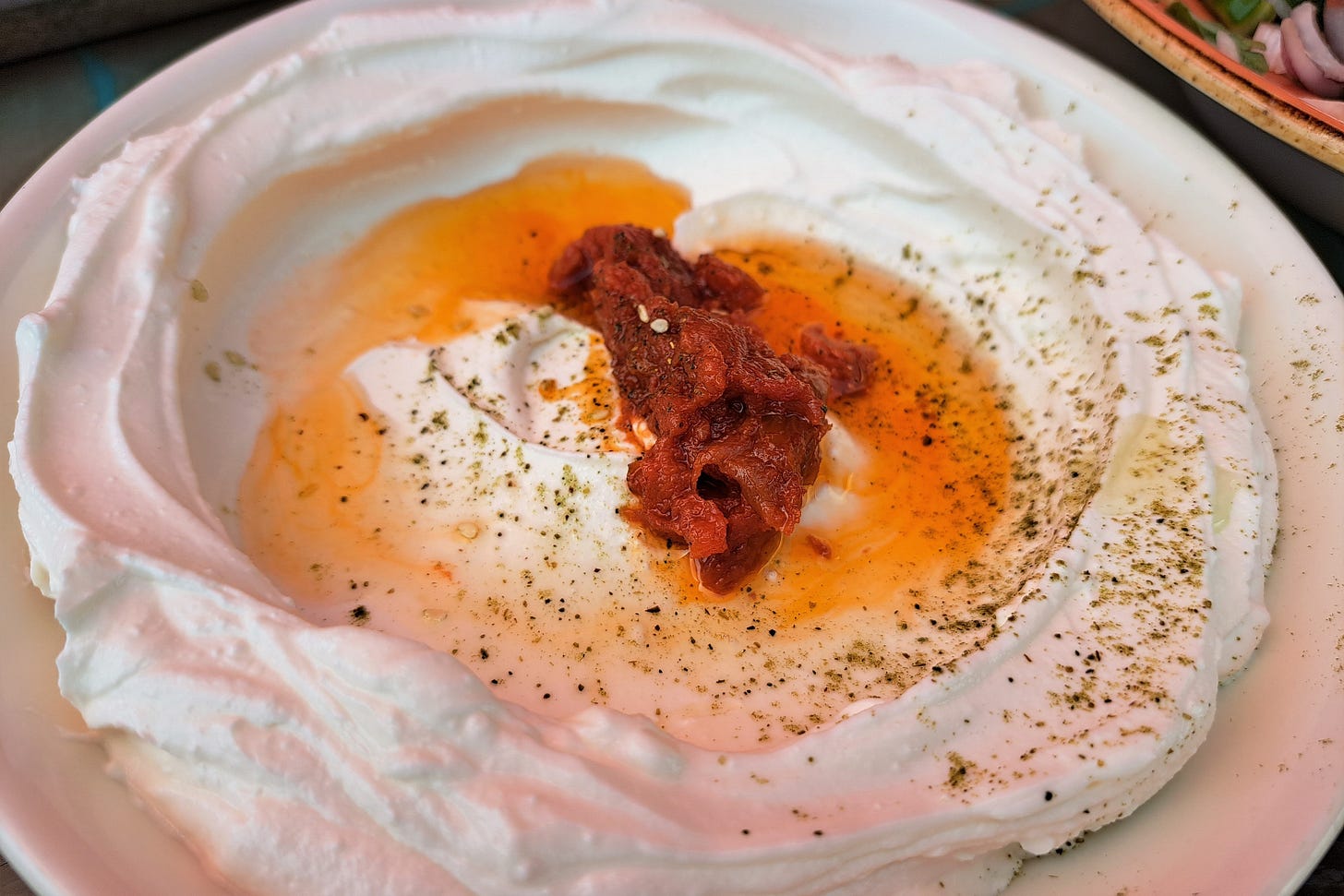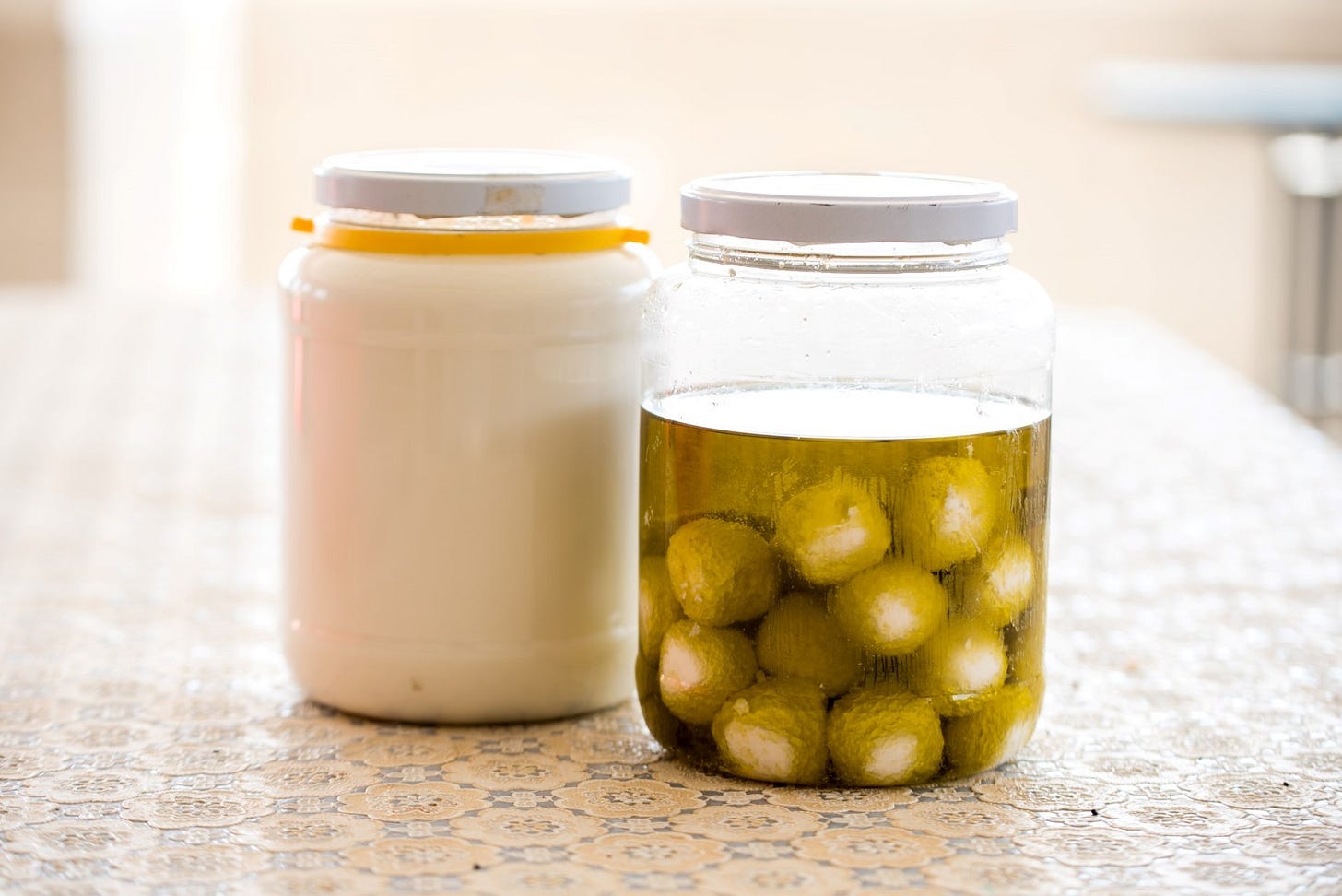Labneh is fermented, strained yoghurt and made into cheese.
It is process that can been traced back thousands of years to one of the earliest forms of dairy, produced in the Levant as a rich source of protein for its inhabitants. In the the hot, arid climate, milk could not be preserved and became sour yoghurt, known as leben, which formed a creamy soft cheese.
Traditionally from goats milk, labneh is now made from cow’s, sheep and plant based milks, which depending on the fattiness of the milk, can vary the thickness of the cheese, from buttery and velvety to formed balls of cheese, often preserved for months in extra virgin olive oil.
Before making labane, many arabic home cooks, start by making their own leben by boiling 1 litre of goat’s milk until it begins to froth, the surface froth is then removed and the milk cooled to lukewarm, 2 tablespoons of yoghurt is mixed into the milk, before being poured into a clean jar. A tight fitting lid is place on the jar and a tea towel wrapped around for insulation, it is then placed in the fridge for 2-3 weeks for the yoghurt to form.
To make labane:
ingredients
500g natural yoghurt or leben
1/2 teaspoon salt
extra virgin olive oil, to serve
method
take a large square of muslin/cheesecloth rinse in cold water & wring out, line a sieve with the damp muslin, draping over the sides and place the sieve over a bowl, to catch the whey
mix the salt into the yoghurt & pour into the muslin lined sieve, fold the cloth over the mixture & twist the top, place in the refrigerator for 10-12 hours, so that all the liquid seeps out leaving only the curds, discard the whey & place the thickened creamy cheese into a bowl
place the labneh into the centre of a serving plate and with the back of a large spoon smear the soft spread evenly to the edge of the plate, rotating the plate to create an indent in the middle, drizzle over extra virgin olive oil
garnishes often include za’atar spice and fresh za’atar or oregano leaves & chopped pistachios, smoked paprika and roasted peppers or sumac and chopped preserved lemons for a citrus zing
scoop onto warm pitta and devour…
To make labane balls:
leave the labane to drain for 3-4 days or until the cheese is dry, stirring the labane each day to release any liquid, form the dry cheese into little balls and place in a container, cover all the balls with extra virgin olive oil and add sprigs of za’atar, oregano or thyme for some extra flavour
they will keep in the refrigerator for 1-2 months
on serving, the labneh balls can be rolled in za’atar spice, sumac or dried mixed herbs, or for some added flavour and texture, sesame or flax seeds
Labane can also be served with sweet dishes.
Lightly whipped with orange or lime zest, icing sugar, vanilla essence, rose water or a little citrus juice, it is a delicious accompaniment to fresh strawberries or raspberries, poached apricots or dolloped onto a pavlova or piece of cake, especially with the added crunch of some chopped pistachios…
Enjoy…








Hi Ruth,
This is Coral (from Irgun Bogrei Habonim).
I am enjoying receiving your emails. Thanks!
Labneh - I have a very simple recipe for my labneh, which is loved by my family and others and it is part of my husband's staple diet.
I use this yoghurt: Yoghurt be'Kad (yoghurt in a jar) - a Tnuva Product. (I live in Israel)
About 4% fat. But I should imagine that any good yogurt, cow, sheep or goat is suitable. I need at least 1 litre of yoghurt. The Yoghurt mentioned above is 1.5 litres or 3 litres.
I use a cloth diaper - a dry one - and open it up over a large (stainless steel) colander. I pour the contents of the yogurt into the diaper (the diaper was pinched from one of my grandkids - never used as a diaper!), I rinse out the container with a little tap water and add it. I add salt and a (large) teaspoon of crushed garlic. I leave it outside of the fridge for 24 hours to drain off - summer or winter. Then I turn it out into a container, smooth it flat and garnish it with zaatar and cover all that with olive oil. It ends up at about 9% fat.
Really delicious!
Just thought that I would share it with you.
All the best,
Coral Navon